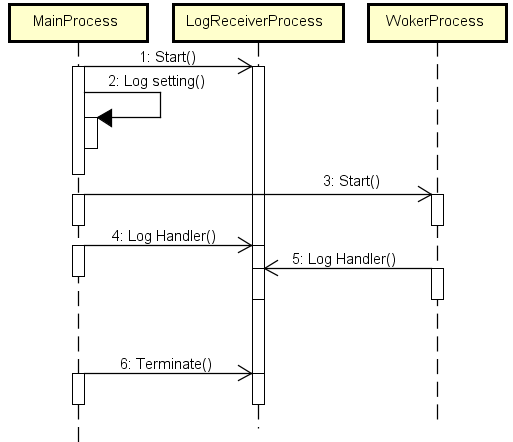因为涉及到进程间互斥与通信问题,因此默认情况下Python中的logging无法在多进程环境下打印日志。但是查询了官方文档可以发现,推荐了一种利用logging.SocketHandler的方案来实现多进程日志打印。
其原理很简单,概括一句话就是说:多个进程将各自环境下的日志通过Socket发送给一个专门打印日志的进程,这样就可以防止多进程打印的冲突与混乱情况。
本文主要记录下SocketHandler真实的用法情况:
1 时序图
简单说明下逻辑:主进程(MainProcess)启动一个专门打印日志的进程(LogReceiverProcess),并且将自己(主进程)环境下的日志都“重定向”给LogReceiverProcess。同理,在后续逻辑中启动的所有工作子进程(WorkerProcess)都做一样的操作,把自己环境下的日志都“重定向”给日志进程去打印。

2 实现代码
2.1 日志进程
日志进程的代码核心在于要建立一个TCP Server来接收并处理Log record,代码如下:

1 import os 2 import logging 3 import logging.handlers 4 import traceback 5 import cPickle 6 import struct 7 import SocketServer 8 from multiprocessing import Process 9 10 class LogRecordStreamHandler(SocketServer.StreamRequestHandler): 11 def handle(self): 12 while True: 13 try: 14 chunk = self.connection.recv(4) 15 if len(chunk) < 4: 16 break 17 slen = struct.unpack(">L", chunk)[0] 18 chunk = self.connection.recv(slen) 19 while len(chunk) < slen: 20 chunk = chunk + self.connection.recv(slen - len(chunk)) 21 obj = self.unpickle(chunk) 22 record = logging.makeLogRecord(obj) 23 self.handle_log_record(record) 24 25 except: 26 break 27 28 @classmethod 29 def unpickle(cls, data): 30 return cPickle.loads(data) 31 32 def handle_log_record(self, record): 33 if self.server.logname is not None: 34 name = self.server.logname 35 else: 36 name = record.name 37 logger = logging.getLogger(name) 38 logger.handle(record) 39 40 41 class LogRecordSocketReceiver(SocketServer.ThreadingTCPServer): 42 allow_reuse_address = 1 43 44 def __init__(self, host='localhost', port=logging.handlers.DEFAULT_TCP_LOGGING_PORT, handler=LogRecordStreamHandler): 45 SocketServer.ThreadingTCPServer.__init__(self, (host, port), handler) 46 self.abort = 0 47 self.timeout = 1 48 self.logname = None 49 50 def serve_until_stopped(self): 51 import select 52 abort = 0 53 while not abort: 54 rd, wr, ex = select.select([self.socket.fileno()], [], [], self.timeout) 55 if rd: 56 self.handle_request() 57 abort = self.abort 58 59 60 def _log_listener_process(log_format, log_time_format, log_file): 61 log_file = os.path.realpath(log_file) 62 logging.basicConfig(level=logging.DEBUG, format=log_format, datefmt=log_time_format, filename=log_file, filemode='a+') 63 64 # Console log 65 console = logging.StreamHandler() 66 console.setLevel(logging.INFO) 67 console.setFormatter(logging.Formatter(fmt=log_format, datefmt=log_time_format)) 68 logging.getLogger().addHandler(console) 69 70 tcp_server = LogRecordSocketReceiver() 71 72 logging.debug('Log listener process started ...') 73 tcp_server.serve_until_stopped()
关键点:
(1)TCPServer的构建逻辑,拆包还原Log记录;
(2)在日志进程中设定好logging记录级别和打印方式,这里除了指定文件存储还添加了Console打印。
2.2 其他进程
除了日志进程之外的进程,设置logging都“重定向”给日志进程,并且要关闭当前进程的日志在Console打印(默认会显示Warning级别及以上的日志到Console),否则Console上日志展示会有重复凌乱的感觉。

1 class LogHelper: 2 # 默认日志存储路径(相对于当前文件路径) 3 default_log_path = os.path.join(os.path.dirname(os.path.realpath(__file__)), '..', 'logs') 4 5 # 记录当前实际的日志所在目录 6 current_log_path = '' 7 8 # 记录当前实际的日志完整路径 9 current_log_file = '' 10 11 # 日志文件内容格式 12 log_format = '[%(asctime)s.%(msecs)03d][%(processName)s][%(levelname)s][%(filename)s:%(lineno)d] %(message)s' 13 14 # 日志中时间格式 15 log_time_format = '%Y%m%d %H:%M:%S' 16 17 # 日志进程 18 log_process = None 19 20 def __init__(self): 21 pass 22 23 @staticmethod 24 def print_console_log(level, message): 25 print '--------------------------------------------------' 26 if level == logging.WARN: 27 level_str = '[WARN]' 28 elif level == logging.ERROR: 29 level_str = '[ERROR]' 30 elif level == logging.FATAL: 31 level_str = '[FATAL]' 32 else: 33 level_str = '[INFO]' 34 print ' %s %s' % (level_str, message) 35 print '--------------------------------------------------' 36 37 @staticmethod 38 def init(clear_logs=True, log_path=''): 39 # 40 console = logging.StreamHandler() 41 console.setLevel(logging.FATAL) 42 logging.getLogger().addHandler(console) 43 44 try: 45 # 如果外部没有指定日志存储路径则默认在common同级路径存储 46 if log_path == '': 47 log_path = LogHelper.default_log_path 48 if not os.path.exists(log_path): 49 os.makedirs(log_path) 50 LogHelper.current_log_path = log_path 51 52 # 清理旧的日志并初始化当前日志路径 53 if clear_logs: 54 LogHelper.clear_old_log_files() 55 LogHelper.current_log_file = LogHelper._get_latest_log_file() 56 57 socket_handler = logging.handlers.SocketHandler('localhost', logging.handlers.DEFAULT_TCP_LOGGING_PORT) 58 logging.getLogger().setLevel(logging.DEBUG) 59 logging.getLogger().addHandler(socket_handler) 60 61 # 62 LogHelper.start() 63 64 except Exception, ex: 65 LogHelper.print_console_log(logging.FATAL, 'init() exception: %s' % str(ex)) 66 traceback.print_exc() 67 68 @staticmethod 69 def start(): 70 if LogHelper.log_process is None: 71 LogHelper.log_process = Process(target=_log_listener_process, name='LogRecorder', args=(LogHelper.log_format, LogHelper.log_time_format, LogHelper.current_log_file)) 72 LogHelper.log_process.start() 73 else: 74 pass 75 76 @staticmethod 77 def stop(): 78 if LogHelper.log_process is None: 79 pass 80 else: 81 LogHelper.log_process.terminate() 82 LogHelper.log_process.join() 83 84 @staticmethod 85 def _get_latest_log_file(): 86 latest_log_file = '' 87 try: 88 if os.path.exists(LogHelper.current_log_path): 89 for maindir, subdir, file_name_list in os.walk(LogHelper.current_log_path): 90 for file_name in file_name_list: 91 apath = os.path.join(maindir, file_name) 92 if apath > latest_log_file: 93 latest_log_file = apath 94 95 if latest_log_file == '': 96 latest_log_file = LogHelper.current_log_path + os.sep + 'system_' 97 latest_log_file += time.strftime("%Y%m%d_%H%M%S", time.localtime(time.time())) + '.log' 98 99 except Exception, ex: 100 logging.error('EXCEPTION: %s' % str(ex)) 101 traceback.print_exc() 102 103 finally: 104 return latest_log_file 105 106 @staticmethod 107 def get_log_file(): 108 return LogHelper.current_log_file 109 110 @staticmethod 111 def clear_old_log_files(): 112 if not os.path.exists(LogHelper.current_log_path): 113 logging.warning('clear_old_log_files() Not exist: %s' % LogHelper.current_log_path) 114 return 115 116 try: 117 for maindir, subdir, file_name_list in os.walk(LogHelper.current_log_path): 118 for file_name in file_name_list: 119 apath = os.path.join(maindir, file_name) 120 if apath != LogHelper.current_log_file: 121 logging.info('DEL -> %s' % str(apath)) 122 os.remove(apath) 123 else: 124 with open(LogHelper.current_log_file, 'w') as f: 125 f.write('') 126 127 logging.debug('Clear log done.') 128 129 except Exception, ex: 130 logging.error('EXCEPTION: %s' % str(ex)) 131 traceback.print_exc()
